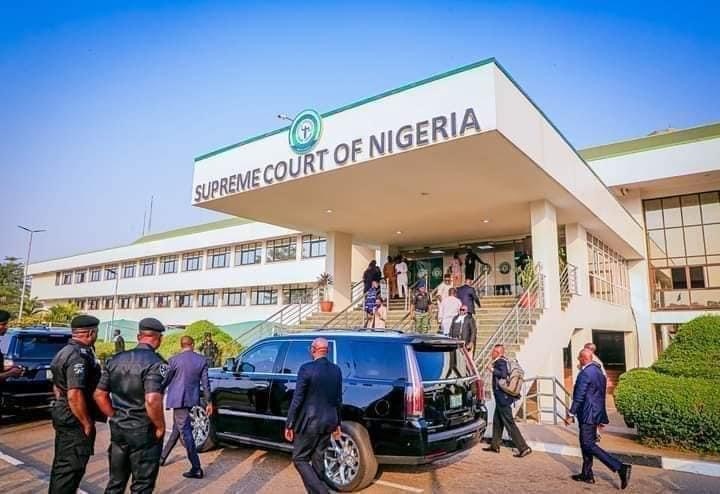Local Government Autonomy: Implications Of Supreme Court Verdict
By Sunday Oguntola
It was victory at last for many local government chairmen and stakeholders. Yesterday’s Supreme Court pronouncements in a suit by the Federal Government against the 36 states will elicit definitive developments that will greatly define the political space and temperature of the nation for years to come.
The seven-man panel of the Supreme Court, in the judgment delivered by Justice Emmanuel Agim, declared that the 774 local government councils in the Federation should manage their funds without interference or deduction from any quarter.
The Court also declared that it is unconstitutional for states to hold funds allocated for local government administration.
The apex court held that the power of the government is portioned into three tiers comprising the federal, state and local government.
The court further declared that a state has no power to appoint a caretaker committee, while it is mandatory for a local government council to be democratically governed.
“A democratically elected local government is sacrosanct and non-negotiable , ‘’ it said emphatically.
The court ruled that states were perpetuating a dangerous trend by refusing to allow democratically-elected local government councils to function, but rather appointing their loyalists who can only be removed by them.
The Attorney-General of the Federation, Lateef Fagbemi (SAN), filed a lawsuit on behalf of the Federal Government, seeking to grant full autonomy and direct funding to all 774 local government councils in the country.
The pronouncements were direct and definitive, making many observers point out that the nation’s political firmament won’t be the same again. For sure, the pronouncements have serious implications for governors , council chairmen and councillors, and local government councils.
Here are a few of them:
· Added impetus for true federalism: Many political analysts have identified the absence of true federalism as a major bane of Nigeria’s democracy. The verdict reinforces the nation’s push towards true federalism. The three tiers of government can now function like they should in a truly federal nation.
· Massive boost for local government autonomy: The Supreme Court ruling is a big, massive boost for local government autonomy. For decades, local governments have suffered under the suffocating grip of governors who not only allegedly divert their funds but also impose chief executives on them. Without the all-conquering powers of governors, council bosses can settle down to work without fear of intimidation and interference.
· Financial autonomy for councils: Many local governments across Nigeria have been deprived of allocations and financial resources required for development. With the verdict, the councils can deploy enough resources for the benefit of rural dwellers and stakeholders.
· Stronger grassroots democratic culture: Owing to decades of imposition through transitional arrangements and caretaker committees, democratic culture has been at the lowest ebb in many local governments. By declaring that governors cannot dissolve democratically-elected local government councils , there would be deeper democratic activities at the grassroots. Councillors, in many local governments, constituting the legislative arm, have been docile, mainly drawing allowances without much to do. With the decision, they will become potent tools to checkmate the excesses of council chairmen, holding them accountable for actions and inactions like they should in a real democratic setting.
· Fully competitive council polls: With governors unable to arbitrarily sack elected local government chairmen, competitions during local government polls would be tougher with many parties emboldened to fight the status quo. They can hold on to their strongholds and give ruling parties a big run for their money. The voters would be the automatic winners with their increased ability to determine their chairmen as against the prevalent culture of imposition and clean sweep by ruling parties.
· Respect for local government chairmen: For years, local government bosses have been seen as disposable political items existing only at the whims and caprices of governors. With this ruling, they can truly hold their heads high and deliver good governance without threat of political persecution and extinction.
· Greater accountability at council levels: Many council bosses have got away with many infractions in the past under the guise of being controlled by states. The new lease of freedom means that people can truly hold them responsible for their actions and inactions. With the ‘culture of favouritism ’ out of the way, local government stakeholders can truly determine helmsmen who perform and those due for replacement at the next electoral cycle.
· Improved democratic dividends at the grassroots: With the most potent, visible ‘excuse’ for non-performance taken care of, observers believe there should be no reason why council chairmen won’t deliver democratic dividends to residents. With Federal allocation directly paid and threat of sack out of the way, council bosses with ingenious political moves should be able to deliver good governance marked with developmental strides.
· Boost for judicial clarity: The Supreme Court pronouncements were neither ambiguous nor ambivalent. They were very concise, precise and direct ; easy to understand. The apex court has shown the lower courts the way to go on cases with significant impact as against ambivalent rulings and judgments , thus leaving room for misinterpretations by counsel and interested parties .
Some political watchers however believe that the apex court went beyond the law in addressing the vexed issue. They contend that the states are empowered by the Constitution to have a say in local government allocation, citing Section 162 (5) and (6) thereof to support their claim.
The above subsections read:
(5): The amount standing to the credit of local government councils in the Federation Account shall also be allocated to the states for the benefit of their local government councils on such terms and in such manner as may be prescribed by the National Assembly
(6): Each state shall maintain a special account to be called ‘State Joint Local Government Account’ into which shall be paid all allocations to the local government councils of the state from the Federation Account and from the government of the state
An observer said last night: “These provisions speak for themselves. If some states are abusing the provisions, the government knows what to do. It is not for the Supreme Court to remove a right granted the states by the Constitution just like that. It is not fair to the states”.
Is there still a remedy for the states? They can go back and ask for a review. Will the court grant it ?
This is indeed the end of impunity, lawlessness and vindictiveness by governors in local government administration. Caretaker committees for local government’s are illegal. Elections must be conducted before the expiration of the tenure of Council chiefs.




